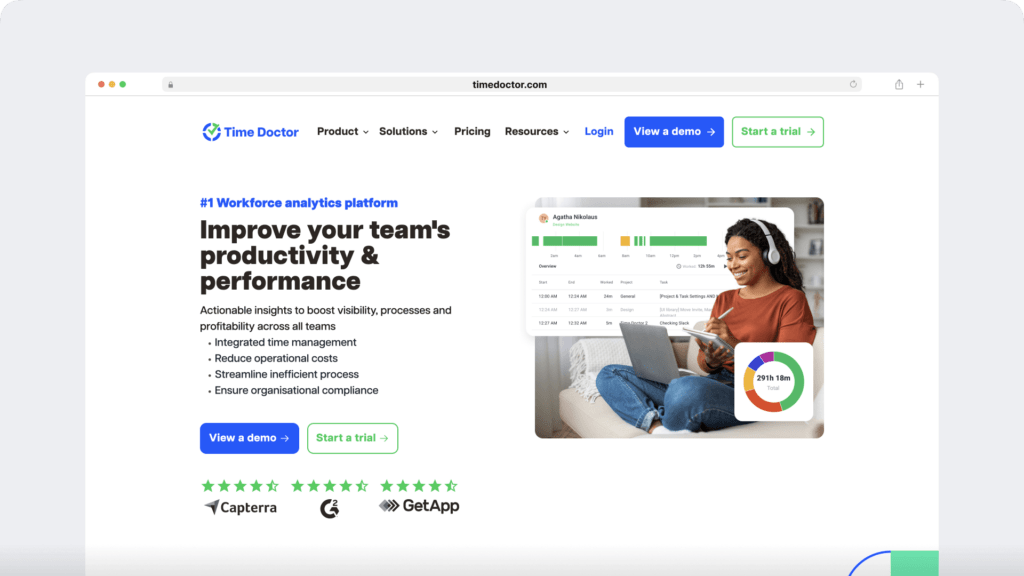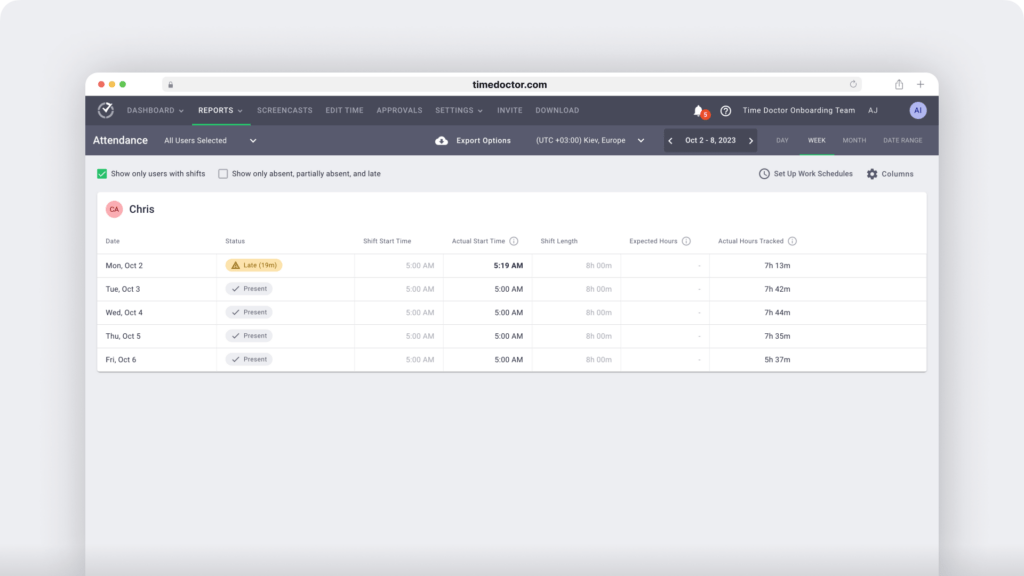Part time work also offers more time to employees to engage in other creative projects.
Curious about the different types of flexible work schedules?
Following a global pandemic, businesses are looking to enhance employee productivity despite limited physical interaction. They have adopted strategies to ensure unobstructed workflow, flexible work schedules being the most popular ones.
So how do you incorporate this evolving schedule system into your company?
In this article, we’ll define flexible work schedules and take a look at the different types of flexible work schedules and working arrangements at your disposal. We’ll also take note of associated compliance issues and possible benefits linked to these schedules.
Table of Contents
- What is a flexible work schedule?
- What are the different types of flexible work schedules?
- Advantages of flexible work schedules
- A smart tool to implement flexible work schedules
- Legal and compliance issues associated with flexible work schedules
- Current trends in flexible work schedules
Let’s dive in.
What is a flexible work schedule?
A flexible work schedule or flex schedule is an alternative to the conventional workweek.
It allows employees to start and end a workday whenever they want, as long as they deliver services during the core hours specified by the employer.
The flex work system also applies to work done from the office as well as from home. The customized schedule transforms routine jobs into flexible jobs or flexjobs.
Such a schedule can be full-time or part-time, affording employees the freedom to pick and choose the hours as per convenience.
And given its benefits, it’s one of the most sought-after work schedules.

What are the different types of flexible work schedules?
Whether you’re located away from the office or can only work on weekends, flex schedules offer options that can suit your human resources team’s various needs.
Let’s take a look at different types of flexible work arrangements and schedules:
1. Compressed workweeks
A compressed work week involves an unequal distribution of work hours throughout the week to reduce the number of working days.
In a compressed work schedule, an employee may choose to work at any time as long as they remain productive for the required work hours needed to complete their job.
For instance, this flexible work option may involve working four 10-hour days in a week, giving you an extra day off every week.
Or you can use a 9-day, 2-week work plan — which compresses two weeks of work into nine days, giving you two days off a month.
In both cases, you need to calculate the extra number of hours or overtime hours (if any).
The compressed workweek gives employees more personal time off work and also saves on commuting costs.
2. Customized working hours / flextime
Much like the compressed schedule, employees can customize their operational hours within a workday with flextime.
These flexible hours allow them to function when they’re most productive.
A split shift schedule also works well here.
Some team members may perform better in the morning, while others may be comfortable working at night. Additionally, employees can take meal breaks when they desire, instead of sticking to a predetermined and rigid lunch break routine.
If team members can avail such flexible working hours every day, their output is bound to increase immensely.
Additionally, the freedom to customize their schedule allows employees to take long breaks and work when they’re well-rested. This way, it helps prevent employee burnout.
3. Alternative schedule
What if you could offer a convenient schedule for employees unavailable during the workweek?
An alternative work schedule is a flexible schedule to follow for those who can’t work within the regular Monday to Friday, five day workweek.
For them, normal work hours are often devoted to part-time jobs, personal matters, child care, etc.
They desire flexibility above all else in their schedules. Such employees can take up an alternate work schedule through the second shift, night shift, or by working on weekends.
This flexible arrangement frees up normal day hours for non-obligatory tasks the employees wish to accomplish.
4. Flexplace
Flexplace refers to the practice of employees working from home or any other remote location (other than the office) on a predetermined schedule.
This could be for a few hours a day or a few days — and could gradually extend for 100% of the time.
Today, we can adopt workplace flexibility in three ways:
A. Telecommuting
Telecommuting or telework involves using computers and other communication devices by employees to overcome the limitations of place and time.
Since it’s a type of flexplace practice, team members can work remotely or from the office, should they choose to do so.
B. Hoteling
Hoteling is a practice similar to telecommuting.
Instead of their permanent workplace, employees reserve a separate co-working space for their job. The reduced dependence on conventional office spaces also cuts costs and benefits for the employer.
C. Snowbird programs
Snowbird is a flexible program with the provision for employees to transfer to warmer regions during the winter months.
This helps attract a larger labor force irrespective of age constraints. Snowbird programs are especially useful for those working in telemarketing and communication roles.
For instance, the American retail chain, CVS, introduced a policy of allowing pharmacists to work from Florida during the winter months.
5. Remote working
Remote work is a flexible work arrangement in which work is performed completely away from the office for a temporary or permanent period.
In the modern job landscape, remote working provides employees with greater flexibility to live and work from anywhere in the world. Since employees’ physical location is insignificant, remote working can also help you find high-skilled candidates worldwide.
However, implementing these systems relies heavily on effective communication and video conferencing channels among team members.
Here’s a toolkit to help you manage remote employees.
6. Part-time positions
To phase out the number of full-time employees and provide flexibility, businesses adopt the concept of part time work.
Here, the job is delegated to team members who work for fewer days or hours than their full-time colleagues.
Their association with the employer may be short-term or a part time work endeavor while pursuing other opportunities.
Part-time employees are usually students or professionals who can’t devote full-time work hours because of prior commitments.
Part time work also offers more time to employees to engage in other creative projects.
A satisfied employee will have more time at their disposal. And with personal projects taken care of, they can contribute more effectively to the organization.
However, you must pay your part time worker fairly.
The organization decides whether team members engaged in part time jobs are exempt employees or not.
Note: Exempt employees usually operate in executive or administrative roles and are not eligible for overtime pay. They earn a fixed salary, irrespective of the number of work hours they put in.
In addition to a part time schedule, managers should advocate partial retirement or phased retirement for older employees.
This cuts short their full-time work and allows them to work from home. The flexibility in switching to a remote work setup could be a welcome change for them – as they may prefer to minimize regular travel due to health considerations.
7. Job sharing
A question most leaders face is how to accomplish a task in the shortest possible time effectively.
One method to achieve this is job sharing or work sharing among coworkers.
Job sharing involves dividing a full-time job between two or more part-time employees. Each employee works for one part of the workweek, while the others work on it the rest of the week.
While similar to a part-time job, work-sharing is also beneficial for employers. Employers now have an assigned job covered even in the absence of one team member.
They no longer need to deal with issues of reassignment and collaboration for a designated task. However, managers should be careful and ensure equal distribution of work among employees.
8. Extra paid time off (PTO)
If you value your high-performing employees, you must incentivize their monotonous work routine by increasing their time off.
This may sound counterproductive to the normal work culture you’re used to. But most employees expect work flexibility from employers today.
The idea of unlimited vacation time for capable employees is being seriously considered as an additional perk by many organizations.
These employee-centric policies motivate them to perform better at work and deliver great results.

Advantages of flexible work schedules
Flexible working hours come in handy during the Coronavirus pandemic era. And their benefits can no longer be overlooked.
If you opt for any of the above practices, there are several advantages for you and your employees:
A. Advantages for employers
Here’s how flex work can benefit employers:
1. Larger talent pool
Flexible work schedules give you access to a wider and more talented applicant pool.
Since flexibility is the norm, you’re free to appoint high-skilled individuals from anywhere in the world to grow your business.
The wider pool also promotes diversity in the workplace.
Modern jobs must offer equal opportunities to people from all spheres of life.
More people from diverse backgrounds now work in the same digital workplace. This fosters cooperation among team member and eliminates discrimination of any kind.
The practice has become a reality because of an evolving flexible work policy.
2. Transparency
Flexible working arrangements operate in a transparent digital environment with the help of employee monitoring tools.
As a result, you can keep a better track of employee attendance, work hours, productivity, etc.
When employees know you’re monitoring them, it can lead to higher productivity and lower absenteeism.
3. Employee retention
As flexible work schedules heavily favor employees and provide them with multiple benefits, they help you retain talented employees.
Systems like part time jobs also offer greater flexibility to employees. With these schedules becoming commonplace, employee discontent within the company decreases drastically.
4. Increased productivity and continuity
Once your team members get used to the employee-driven work culture, flexible work schedules boost their productivity.
With a highly productive and motivated workforce, your organization can scale to greater heights.
With a distributed employee network, managers can ensure that operations continue even during emergencies like extreme weather conditions or a pandemic with a distributed employee network.
5. Cost-effectiveness
For work-from-home setups, you can select a group health insurance plan for your employees.
Since the risk to health insurers is divided among several members of the group, flexible working arrangements can also save you several dollars in insurance costs.
Additionally, since most flexible work schedules require employees to work outside the office, you can save up on rent, office supplies, utilities, etc.
B. Advantages for employees
Here’s why employees prefer flexible work schedules:
1. Heightened morale
A flexible working arrangement that focuses on employee convenience can boost team morale.
Such a scenario is also free from overbearing hierarchical interferences (in other words, micromanagement.) This can help increase employee job satisfaction.
2. Better work life balance
Flexible scheduling works to restore the optimal balance between working and non-working hours.
Your team enjoys a better work life balance with more time available for childcare, part-time study, and other creative pursuits.
3. Location flexibility
Since most flexible work schedules do not require employees to be present at any specific location, employees enjoy the freedom to travel and work whenever they want.
A smart tool to implement flexible work schedules
Once you’ve chosen a flexible work schedule model, how do you go about implementing it for your team?
You’ll need robust employee productivity software like Time Doctor to help you out.
What’s Time Doctor?

Time Doctor is a powerful employee time tracking and performance management tool used by major corporations as well as by small businesses to manage flexible work schedules of employees across the board.
Time Doctor helps you set a flexible or fixed schedule for each employee and record the time they spend on their respective shifts.
The software automatically designates employees who reach on time as ‘Present.’ If an employee is late, they’re marked as ‘Partially Absent.’ And if they don’t show up at all, they are ‘Absent.’

Legal and compliance issues associated with flexible work schedules
Since the system of flexible work schedules is a fairly new idea, the US Fair Labor Standards Act (FLSA) doesn’t have comprehensive provisions concerning it.
Guidelines about work arrangements different from mainstream work, like ad-hoc work schedules, have to be agreed upon by employer and employee.
Once you adopt these flexible working conditions for your modern digital worksite, you must safeguard employee interests as you would in a normal work environment:
1. Equal employment opportunity compliance
Make sure to put guidelines in place to guarantee non-discrimination in hours of work, wages, and conditions of work. You should also work towards eliminating any inherent bias within your organization.
2. Wage and hour compliance
While implementing flextime schedules, the assurances provided to your employees must comply with federal and state wage and hour laws in implementing flextime.
Concerns linked with telecommuting such as, identifying accurate time period for compensation, controlling unauthorized work beyond the mandated time limit, handling overtime pay, etc., must be handled impartially.
3. Benefits compliance
All employee eligible benefits must be provided to the team which uses a flexible work schedule.
Since this is a legally grey area, you’re responsible for administering it judiciously.
Some employees may put in more hours of work. The organization needs to be careful if such workers are non-exempt employees. Non-exempt employees are entitled to overtime pay in addition to a minimum wage.
For non-exempt employees, the organization is responsible for providing them with benefits and bonuses.
Current trends in flexible work schedules
As the workforce continues to evolve, new trends and technological advancements are shaping how businesses approach flexible work. Let’s take a look at some of the most significant trends driving workplace flexibility today.
1. The rise of the 4-day workweek
One of the most prominent trends in flexible work is the growing adoption of the 4-day workweek. This arrangement condenses the traditional 40-hour, 5-day workweek into four days without reducing pay. Advocates argue that it boosts productivity, reduces burnout, and improves work-life balance.
- Global Initiatives: Several countries are experimenting with the 4-day workweek. Iceland conducted a widely publicized trial from 2015 to 2019, where employees worked fewer hours with no reduction in pay. The results showed improved productivity and worker well-being, leading many businesses to permanently adopt the model.
- UK and Spain Trials: In the UK, multiple companies are participating in a 4-day workweek trial, exploring its impact on productivity and employee satisfaction. Spain has also launched a pilot program subsidizing companies that reduce their employees’ workweek to four days, without cutting salaries.
This shift highlights the growing emphasis on results-driven work environments over traditional time-based productivity models, allowing employees more personal time while maintaining or even increasing their effectiveness at work.
2. AI and automation supporting flexible work
The integration of AI tools and automation is revolutionizing how flexible work schedules are managed. AI can streamline tasks like scheduling, time tracking, and workflow management, making it easier for both employers and employees to adapt to non-traditional work hours.
- Automated scheduling: Tools like Time Doctor and others help businesses schedule employees based on their availability, time zones, and workload, minimizing the administrative burden on managers. These systems can automatically allocate tasks to employees working different hours, ensuring seamless collaboration across global teams.
- Enhanced productivity insights: Automation is also driving advancements in employee monitoring and productivity analytics. Tools can now track productivity trends, flag potential inefficiencies, and suggest optimized schedules based on individual and team performance. This level of insight supports the successful implementation of flexible work schedules by ensuring employees remain productive regardless of where or when they work.
3. Government initiatives and legislative changes
Around the world, governments are increasingly acknowledging the importance of workplace flexibility, especially following the COVID-19 pandemic. Several countries are pushing for legislative changes to support remote and flexible work:
- Netherlands: In 2022, the Dutch Parliament passed a law making remote work a legal right. Under this legislation, employers must consider remote work requests, especially when it aligns with operational needs, signaling a major push toward normalizing flexible work arrangements.
- Portugal: Portugal updated its labor laws to strengthen remote work rights, including rules on communication outside of working hours and reimbursing employees for costs incurred from working remotely, such as internet or electricity. These initiatives aim to support a healthier work-life balance for remote workers.
These trends reflect a broader shift toward more employee-centric work models, driven by both technological innovation and government action. With AI and automation making it easier to manage flexible schedules and legislative changes supporting remote work, businesses must stay ahead of these trends to remain competitive.
Here are some notable free employee scheduling software.
Wrap up
Work away from work is the reality of modern business operations.
Flexible schedule options afford you the twin benefits of increasing employee engagement and keeping your business up-to-date.
And you’re now equipped with all the information needed to make a choice.
So you can go ahead and select a flexible schedule customized to your unique business needs!

Liam Martin is a serial entrepreneur, co-founder of Time Doctor, Staff.com, and the Running Remote Conference, and author of the Wall Street Journal bestseller, “Running Remote.” He advocates for remote work and helps businesses optimize their remote teams.


